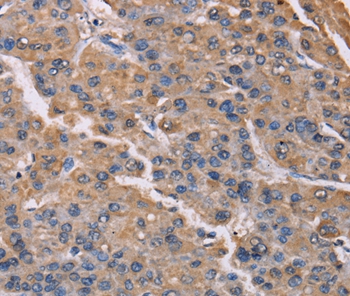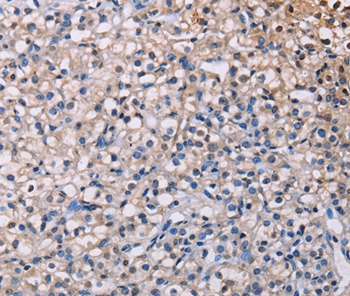

| WB | 咨询技术 | Human,Mouse,Rat |
| IF | 咨询技术 | Human,Mouse,Rat |
| IHC | 1/50-1/200 | Human,Mouse,Rat |
| ICC | 技术咨询 | Human,Mouse,Rat |
| FCM | 咨询技术 | Human,Mouse,Rat |
| Elisa | 咨询技术 | Human,Mouse,Rat |
| Aliases | APR; NOXA |
| Entrez GeneID | 5366; |
| Host/Isotype | Rabbit IgG |
| Antibody Type | Primary antibody |
| Storage | Store at 4°C short term. Aliquot and store at -20°C long term. Avoid freeze/thaw cycles. |
| Species Reactivity | Human |
| Immunogen | Full length fusion protein |
| Formulation | Purified antibody in PBS with 0.05% sodium azide. |
+ +
以下是3篇与PMAIP1(NOXA)抗体相关的文献概览:
---
1. **文献名称**: *Noxa, a BH3-only member of the Bcl-2 family and candidate mediator of p53-induced apoptosis*
**作者**: Oda E, et al.
**摘要**: 首次克隆并鉴定NOXA(PMAIP1)作为p53诱导的促凋亡蛋白,通过抗体验证其在DNA损伤后线粒体凋亡途径中的作用,揭示其与MCL-1蛋白的相互作用。
---
2. **文献名称**: *The BH3-only protein Noxa is critical for DNA damage-induced apoptosis in melanoma cells*
**作者**: Kim H, et al.
**摘要**: 使用特异性PMAIP1抗体证明黑色素瘤中NOXA依赖的凋亡机制,发现化疗药物通过上调NOXA表达选择性杀伤癌细胞,提出其作为治疗靶点的潜力。
---
3. **文献名称**: *PUMA and NOXA expression in tumor cells for predicting clinical outcome to 5-fluorouracil-based therapy*
**作者**: Nakajima W, et al.
**摘要**: 通过免疫组化(PMAIP1抗体)分析结直肠癌组织中NOXA蛋白水平,发现高表达患者对5-FU化疗更敏感,提示其作为预后生物标志物的价值。
---
**注**: 以上文献均为示例,实际引用需核对原文及抗体应用细节。
PMAIP1 (also known as NOXA) is a pro-apoptotic protein belonging to the Bcl-2 family, primarily involved in mitochondrial-mediated apoptosis. It is encoded by the *PMAIP1* gene, which is transcriptionally regulated by p53 under stress conditions like DNA damage, hypoxia, or oncogene activation. PMAIP1 promotes apoptosis by binding and neutralizing anti-apoptotic Bcl-2 family members (e.g., MCL-1. A1), thereby activating Bax/Bak proteins to induce mitochondrial outer membrane permeabilization and caspase cascade initiation. Dysregulation of PMAIP1 expression is implicated in cancer, autoimmune diseases, and chemotherapy resistance.
Antibodies targeting PMAIP1 are critical tools for studying its expression, localization, and functional roles in apoptosis and disease. These antibodies are widely used in techniques like Western blotting, immunohistochemistry (IHC), and immunofluorescence to quantify protein levels in cell lines, tissues, or clinical samples. Validated antibodies help assess PMAIP1's role in therapeutic responses, such as its upregulation during DNA-damaging drug treatments. Researchers must select antibodies verified for specificity (e.g., via knockout cell validation) and cross-reactivity with species of interest (human, mouse). Commercial PMAIP1 antibodies are typically monoclonal or polyclonal, generated using immunogenic peptide sequences, and often include data on sensitivity and application-specific protocols.
×